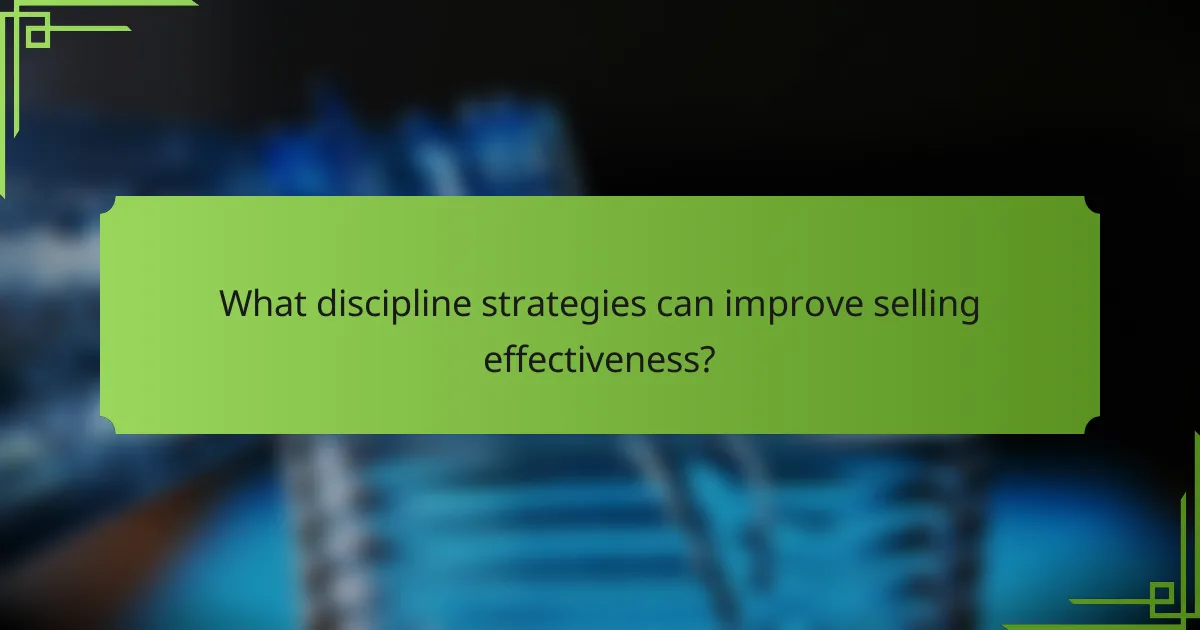To make money effectively, explore trending products like eco-friendly items, digital services, and health-related goods. Embrace essential mindset shifts, focusing on customer needs and resilience. Implement discipline strategies, such as goal setting and time management, to enhance your selling effectiveness. Avoid common mistakes that hinder profitability by prioritising market research and customer relationships.

What are the most profitable ideas to sell in today’s market?
To make money today, focus on trending products like eco-friendly items, digital services, and health-related goods. These categories show high demand and profit potential.
Consider selling sustainable products such as reusable bags, biodegradable utensils, and organic skincare. The market for these items is growing as consumers prioritise environmental impact.
Digital services like online courses, graphic design, and social media management are profitable due to low overhead costs. The shift to remote work has increased demand for these services.
Health-related products, including fitness equipment and wellness supplements, are thriving. The rise in health consciousness drives consumers to invest in their well-being.
How do consumer trends influence profitable product choices?
Consumer trends significantly shape profitable product choices by revealing market demands and consumer preferences. Businesses that analyse these trends can identify high-demand products and adjust their offerings accordingly. For instance, the rise in sustainability awareness influences consumers to favour eco-friendly products, creating opportunities for brands that align with this value. Additionally, tracking social media and online behaviours enables companies to anticipate shifts in consumer interests, ensuring timely product launches. Ultimately, understanding consumer trends equips businesses with the insights needed to make informed, profitable decisions.
What are the core characteristics of successful products?
Successful products share key characteristics that drive profitability and market acceptance. They solve specific problems, fulfil customer needs, and offer unique value propositions. A strong brand identity and clear messaging enhance their appeal. Additionally, successful products often exhibit adaptability to market trends and customer feedback, ensuring sustained relevance. Effective marketing strategies and robust distribution channels further contribute to their success.
What role does market research play in identifying profitable ideas?
Market research is crucial for identifying profitable ideas as it uncovers customer needs and market trends. It provides data-driven insights that guide business decisions. By analysing consumer behaviour, preferences, and competitive landscapes, market research reveals opportunities for innovation and differentiation. This process reduces risks associated with new product launches and helps businesses align their offerings with demand. Ultimately, effective market research enhances strategic planning and increases the likelihood of financial success.
How can niche markets lead to higher profitability?
Niche markets can lead to higher profitability by targeting specific customer needs and reducing competition. This focus allows businesses to charge premium prices and foster customer loyalty. Unique attributes of niche markets include specialised products and tailored marketing strategies, which enhance value perception. By understanding consumer preferences, businesses can create offerings that resonate deeply, driving sales and profitability.

What mindset shifts are necessary for successful selling?
Successful selling requires significant mindset shifts, including embracing a growth mindset, focusing on customer needs, and developing resilience. Adopting a growth mindset fosters adaptability and learning from failures, essential for overcoming challenges in sales. Prioritising customer needs shifts the focus from selling products to providing solutions, enhancing relationships and trust. Resilience helps navigate rejection and setbacks, maintaining motivation and a positive outlook. These mindset changes are crucial for achieving sustained success in selling.
How do limiting beliefs about money impact sales success?
Limiting beliefs about money can significantly hinder sales success by creating mental barriers that restrict confidence and motivation. These beliefs often lead to self-sabotage, making it difficult to pursue opportunities or engage effectively with potential clients.
For instance, individuals may believe they are not worthy of high sales or fear rejection, which can prevent them from making necessary sales calls or closing deals. As a result, these limiting beliefs can manifest in lower sales performance and missed revenue targets.
Addressing these beliefs through mindset shifts, such as adopting a growth mindset and reframing negative thoughts, can enhance sales effectiveness. Cultivating discipline strategies, including setting clear goals and maintaining accountability, further supports overcoming these mental obstacles.
What positive affirmations can enhance selling confidence?
Positive affirmations that enhance selling confidence include statements like “I am capable of closing deals” and “I attract customers effortlessly.” These affirmations help shift mindset, reinforcing belief in one’s sales abilities. Regularly repeating affirmations can improve self-esteem and focus, leading to increased sales performance. Incorporating affirmations into daily routines fosters resilience and discipline, essential for success in selling.

What discipline strategies can improve selling effectiveness?
Effective discipline strategies can significantly enhance selling effectiveness by fostering consistency and accountability. Implementing structured routines, such as daily goal setting and regular performance reviews, helps maintain focus on sales targets. Utilising time management techniques, like the Pomodoro Technique, encourages productive work sessions, minimising distractions. Additionally, cultivating a growth mindset allows sales professionals to embrace challenges and learn from setbacks, ultimately improving resilience and adaptability in a competitive market. Establishing a supportive team culture also reinforces discipline, as collaboration and shared accountability drive collective success.
How can time management techniques boost productivity in sales?
Effective time management techniques can significantly enhance productivity in sales. By prioritising tasks, sales professionals can focus on high-impact activities that drive revenue. Techniques such as the Pomodoro Technique or time blocking help maintain concentration, reducing distractions.
Additionally, setting clear goals and deadlines fosters accountability, which is crucial for maintaining momentum in sales. Regularly reviewing progress allows for adjustments, ensuring strategies remain aligned with objectives. Implementing these techniques cultivates a disciplined mindset, ultimately leading to increased sales performance and profitability.
What daily routines are most effective for successful salespeople?
Successful salespeople maintain effective daily routines that prioritise time management, goal setting, and continuous learning. They typically start their day with planning, reviewing goals, and organising tasks. Engaging in regular networking and relationship-building activities is crucial. Additionally, they dedicate time to personal development through reading and training. These routines foster discipline, enabling them to adapt and thrive in competitive environments.
How does goal setting influence sales discipline?
Goal setting significantly enhances sales discipline by providing clear targets and motivation. It creates a structured approach, enabling sales professionals to track progress and adjust strategies. This discipline fosters accountability, ensuring consistent effort towards achieving sales goals. Additionally, setting specific, measurable goals encourages a growth mindset, promoting resilience in facing challenges.

What unique attributes differentiate successful sellers from others?
Successful sellers differentiate themselves through unique attributes such as adaptability, customer-centric focus, and resilience. These qualities enable them to respond effectively to market changes and customer needs. Adaptability allows sellers to pivot strategies quickly, fostering innovation. A customer-centric focus builds strong relationships, enhancing loyalty. Resilience helps sellers overcome setbacks, maintaining motivation and discipline. These attributes contribute to sustained success in identifying profitable opportunities.
How does emotional intelligence contribute to sales success?
Emotional intelligence significantly enhances sales success by fostering better relationships and understanding customer needs. Sales professionals with high emotional intelligence can empathise with clients, leading to increased trust and loyalty. This ability to read emotions and respond appropriately allows for tailored sales strategies, ultimately boosting conversion rates. Furthermore, emotional intelligence aids in managing stress and maintaining motivation, crucial for consistent performance in sales.
What role does adaptability play in changing markets?
Adaptability is crucial in changing markets as it allows businesses to respond quickly to evolving consumer demands. Companies that embrace adaptability can pivot their strategies, products, and services effectively, ensuring they remain competitive. For instance, businesses that analyse market trends and adjust their offerings accordingly often see increased profitability. This ability to adapt not only enhances resilience but also fosters innovation, creating new opportunities for growth. In essence, adaptability is a unique attribute that directly influences a company’s success in dynamic market environments.

What rare attributes can lead to exceptional selling outcomes?
Rare attributes that can lead to exceptional selling outcomes include unique product features, niche market targeting, and innovative pricing strategies. Unique attributes, such as patented technology or exclusive partnerships, create differentiation. Targeting niche markets allows sellers to connect with specific customer needs, enhancing engagement. Innovative pricing strategies, like subscription models or tiered pricing, can increase perceived value and customer retention. These rare attributes foster competitive advantages that drive sales success.
How can creativity enhance product offerings?
Creativity enhances product offerings by fostering innovation and differentiation. Unique product designs attract consumers, while creative marketing strategies improve brand visibility. For example, companies like Apple leverage creativity to develop user-friendly interfaces and aesthetically pleasing products, driving customer loyalty. Emphasising creativity can lead to higher perceived value and increased sales.
What uncommon strategies have led to breakthrough sales results?
Uncommon strategies that lead to breakthrough sales results include leveraging behavioural psychology, creating scarcity through limited-time offers, and utilising social proof effectively. These approaches foster urgency and trust, significantly boosting conversion rates. For example, implementing a referral programme can harness existing customers to attract new ones, enhancing brand credibility. Additionally, focusing on niche markets allows businesses to tailor products and marketing strategies, addressing specific needs and maximising profitability.

What are the common mistakes to avoid in selling?
To succeed in selling, avoid common mistakes like neglecting market research, failing to understand customer needs, and lacking a clear value proposition. These errors can hinder profitability and growth.
One major mistake is underestimating the importance of building relationships with customers. Establishing trust can lead to repeat business and referrals. Additionally, not setting measurable goals can result in a lack of direction and accountability in sales efforts.
Another critical error is ignoring feedback. Customer insights can guide product improvements and marketing strategies. Lastly, many sellers fail to adapt to changing market conditions, which can lead to lost opportunities.
By recognising and addressing these mistakes, sellers can enhance their strategies and increase their chances of making money.
How can understanding consumer psychology prevent selling errors?
Understanding consumer psychology helps identify and mitigate selling errors by aligning offerings with customer needs. Insights into behaviour, preferences, and motivations enable sellers to tailor products effectively. For instance, recognising emotional triggers can lead to better marketing strategies, reducing misalignment between product features and consumer expectations. Additionally, leveraging psychological principles like scarcity and social proof can enhance perceived value, minimising potential selling mistakes. Overall, applying consumer psychology fosters a more disciplined approach to product selection, ensuring profitability through informed decision-making.
What best practices should be implemented for consistent success?
To achieve consistent success, implement a disciplined approach, maintain a growth-oriented mindset, and identify profitable ideas. Establish clear goals and regularly evaluate progress. Embrace adaptability and continuous learning to refine strategies. Prioritise effective time management and resource allocation to optimise efforts. Foster a supportive network for accountability and collaboration.
What optimisation tips can enhance sales strategies immediately?
Implementing optimisation tips can significantly enhance sales strategies. Focus on understanding customer needs, leveraging data analytics, and refining your sales funnel.
First, prioritise customer engagement through personalised communication. Utilise CRM tools to track interactions and preferences, ensuring tailored follow-ups.
Second, analyse sales data to identify trends and opportunities. Use insights to adjust your offerings and target audience effectively.
Third, streamline your sales process by eliminating bottlenecks. Ensure a smooth transition from lead generation to closing, enhancing the overall customer experience.
Lastly, invest in training your sales team. Equip them with the latest techniques and product knowledge to boost confidence and performance.




